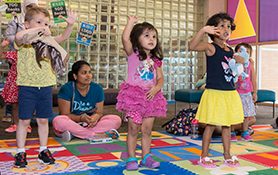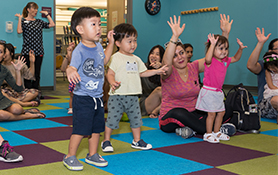Longer, more complex stories and movement activities promote language and listening skills, enhance age-appropriate motor skills, expand imaginations and inspire a child’s curiosity about the world. Weekly themes explore more complex topics, introduce new vocabulary and reinforce early literacy skills. Typically 25-30 minutes.
Early learning programs run for 30 minutes and provide developmentally appropriate opportunities for parents and caregivers to interact with young children by playing, reading, talking, singing and writing to encourage literacy, school readiness and life-long learning.
Longer, more complex stories and movement activities promote language and listening skills, enhance age-appropriate motor skills, expand imaginations and inspire a child’s curiosity about the world. Weekly themes explore more complex topics, introduce new vocabulary and reinforce early literacy skills. Typically 25-30 minutes.
Early learning programs run for 30 minutes and provide developmentally appropriate opportunities for parents and caregivers to interact with young children by playing, reading, talking, singing and writing to encourage literacy, school readiness and life-long learning.
Simple, short stories and movement activities help introduce the sounds and rhythms of language while developing age-appropriate motor skills. New themes and repeating elements each week encourage interaction, introduce words and their sounds and explore simple concepts. Typically 20-25 minutes.
Early learning programs run for 30 minutes and provide developmentally appropriate opportunities for parents and caregivers to interact with young children by playing, reading, talking, singing and writing to encourage literacy, school readiness and life-long learning.
Simple, short stories and movement activities help introduce the sounds and rhythms of language while developing age-appropriate motor skills. New themes and repeating elements each week encourage interaction, introduce words and their sounds and explore simple concepts. Typically 20-25 minutes.
Early learning programs run for 30 minutes and provide developmentally appropriate opportunities for parents and caregivers to interact with young children by playing, reading, talking, singing and writing to encourage literacy, school readiness and life-long learning.
Simple, short stories and movement activities help introduce the sounds and rhythms of language while developing age-appropriate motor skills. New themes and repeating elements each week encourage interaction, introduce words and their sounds and explore simple concepts. Typically 20-25 minutes.
Early learning programs run for 30 minutes and provide developmentally appropriate opportunities for parents and caregivers to interact with young children by playing, reading, talking, singing and writing to encourage literacy, school readiness and life-long learning.
Simple, short stories and movement activities help introduce the sounds and rhythms of language while developing age-appropriate motor skills. New themes and repeating elements each week encourage interaction, introduce words and their sounds and explore simple concepts. Typically 20-25 minutes.
Early learning programs run for 30 minutes and provide developmentally appropriate opportunities for parents and caregivers to interact with young children by playing, reading, talking, singing and writing to encourage literacy, school readiness and life-long learning.
Simple, short stories and movement activities help introduce the sounds and rhythms of language while developing age-appropriate motor skills. New themes and repeating elements each week encourage interaction, introduce words and their sounds and explore simple concepts. Typically 20-25 minutes.
Early learning programs run for 30 minutes and provide developmentally appropriate opportunities for parents and caregivers to interact with young children by playing, reading, talking, singing and writing to encourage literacy, school readiness and life-long learning.
Simple, short stories and movement activities help introduce the sounds and rhythms of language while developing age-appropriate motor skills. New themes and repeating elements each week encourage interaction, introduce words and their sounds and explore simple concepts. Typically 20-25 minutes.
Early learning programs run for 30 minutes and provide developmentally appropriate opportunities for parents and caregivers to interact with young children by playing, reading, talking, singing and writing to encourage literacy, school readiness and life-long learning.
Simple, short stories and movement activities help introduce the sounds and rhythms of language while developing age-appropriate motor skills. New themes and repeating elements each week encourage interaction, introduce words and their sounds and explore simple concepts. Typically 20-25 minutes.
Early learning programs run for 30 minutes and provide developmentally appropriate opportunities for parents and caregivers to interact with young children by playing, reading, talking, singing and writing to encourage literacy, school readiness and life-long learning.
Simple, short stories and movement activities help introduce the sounds and rhythms of language while developing age-appropriate motor skills. New themes and repeating elements each week encourage interaction, introduce words and their sounds and explore simple concepts. Typically 20-25 minutes.
Early learning programs run for 30 minutes and provide developmentally appropriate opportunities for parents and caregivers to interact with young children by playing, reading, talking, singing and writing to encourage literacy, school readiness and life-long learning.


